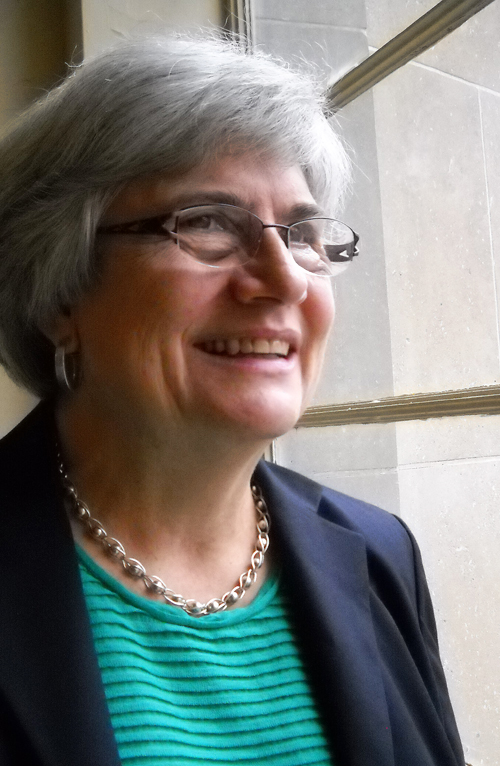
If you’re wrestling with your weight or metabolic syndrome, or you’re looking to prevent or control diabetes, your family health team (FHT) might be the first place to turn for help. So says Prof. Paula Brauer, Family Relations and Applied Nutrition, who studies the role of health practitioners in managing weight and obesity.
Last fall she received a Bright Light Award from the Association of Family Health Teams of Ontario (AFHTO). The awards recognize contributions by AFHTO members to three million patients across the province.
Representing Dietitians of Canada for five years in the 2000s, Brauer helped promote the role of registered dietitians to the province’s Ministry of Health and Long-Term Care. In the late 1980s, she chaired an Ontario advocacy group calling for dietitians within health teams.
“Family health teams were not a gleam in anyone’s eye then,” she says.
As a kind of one-stop shop for patients, family health teams bring together doctors and other health-care professionals such as social workers, dietitians and pharmacists. One in five Ontarians belongs to such a health team, which Brauer says makes more sense than solo medical practices that often separate services into silos.
“Eighty per cent or more of Canadians visit their family doctor once a year,” she says, “so it is the bedrock of the system, but it’s also one of the least celebrated areas of health care. For most of the population, it’s actually the family physician who’s providing the majority of health care.”
She led a study that placed dietitians for the first time into practices in Kingston, Stratford and Parry Sound. They found that nutrition questions arise in one out of every five doctor visits. These professionals can support nutrition care by all team members and provide direct services, says Brauer.
“Patients benefit when the nutrition advice is accurate and tailored to their own health issues. There is a lot of nutrition misinformation out there – people are very confused.”
She began looking at the role of dietitians in hospitals and long-term care facilities in the mid-1980s at the University of Alberta.
At Guelph, she studies obesity management in primary care.
One in four Canadian adults is obese; that proportion has tripled since 1980. Some obese people are fit and not at high health risk, she says. But obesity – measured as a body-mass index above 30 – is a risk factor for cardiovascular disease. Excess weight can also lead to metabolic problems such as high blood pressure in middle age.
Cardio-metabolic syndrome affects one in five of all Canadians and up to 40 per cent of those in middle age and older.
“As a health-care issue, cardio-metabolic syndrome is high-priority, because lifelong drug costs are high, and evidence of benefits from lifestyle changes has been shown,” she says.
Brauer is now studying diet and physical activity counselling at three primary care clinics in Edmonton, Toronto and Quebec City. She’s working with researchers at McMaster University, the University of Toronto, Queen’s University, the University of Alberta and Laval University.
Study participants receive three months’ worth of counselling, and researchers follow them for a year. Early results have been promising, she says. Out of 59 participants, 13 people no longer had the syndrome after three months.
This topic meshes with Brauer’s interests in primary health care. Team practices can help promote lifestyle changes to improve health, she says. Rather than treating individual issues, teams can work on systemic ways to reduce risks of developing diabetes or suffering heart attacks or strokes.
“Studies show that with modest weight loss – five per cent – and increased physical activity, you can reduce the risk for diabetes by half,” says the Guelph researcher. “Weight is such a sensitive issue. Many family physicians struggle with how to best advise their patients. We know now that excess weight needs to be considered as a chronic condition to be managed.”
Practices in primary care facilities vary from one place to another. “What works and what doesn’t? We will review the results for the most promising ways to organize services.”
Brauer says these issues hit close to home. Her grandmother, who died at 68 of diabetes, had tried various nutrition programs and dietary supplements without success. Many family members wrestle with weight issues. “I was always very interested in cooking, and food was central to family life.”
About five years ago, her husband persuaded her to take up physical activity as a must-do. Now, armed with her MP3 player and a 1,000-song playlist, Brauer visits the campus gym two or three times a week to work out on elliptical and other machines. Next she plans to try Pilates.
Her pet complaint? “Media nonsense” about nutrition – including often contradictory advice — that sends consumers swinging from one fad or extreme to another. Far better to find the “sensible middle ground” in diet and activity, she says.